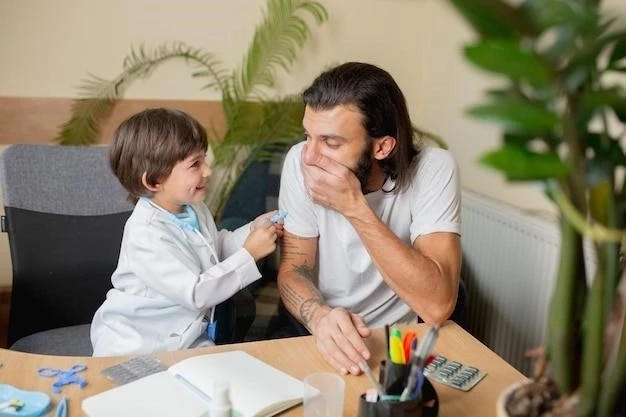Understanding 3-M Syndrome⁚ Causes and Symptoms
Causes of 3-M Syndrome
3-M Syndrome is primarily caused by mutations in specific genes related to growth regulation. These genetic mutations can affect normal growth processes‚ leading to the characteristic features of the syndrome.
Symptoms of 3-M Syndrome
Individuals with 3-M Syndrome typically exhibit features such as short stature‚ distinctive facial characteristics‚ and skeletal abnormalities. Other common symptoms include delayed development and intellectual disabilities.

Treatment Options for Rare Diseases like 3-M Syndrome
Growth Hormone Therapy
Growth hormone therapy is a common treatment for individuals with 3-M Syndrome to promote growth and development. This therapy involves regular administration of synthetic growth hormone to improve height and overall health outcomes.
Physical Therapy and Occupational Therapy
Physical therapy and occupational therapy are essential for individuals with 3-M Syndrome to improve motor skills‚ muscle strength‚ and overall functional abilities. These therapies are crucial components of a comprehensive treatment plan.
Genetic Testing for 3-M Syndrome
Importance of Genetic Testing
Genetic testing is crucial for diagnosing 3-M Syndrome‚ guiding treatment decisions‚ and providing accurate genetic counseling. Understanding the underlying genetic cause can help tailor individualized care and support for patients and their families.
Procedure of Genetic Testing
The procedure typically involves a blood sample or a cheek swab to analyze the individual’s DNA for specific gene mutations associated with 3-M Syndrome. Results from genetic testing can confirm the diagnosis and provide valuable insights for healthcare management.
Research Advances in 3-M Syndrome
Current Research Studies
Ongoing studies are focusing on identifying new genetic variants associated with 3-M Syndrome‚ exploring potential treatment targets‚ and improving diagnostic tools. These research efforts aim to enhance our understanding and management of this rare genetic disorder.
Future Directions in Research
Future research aims to improve early diagnostic methods for 3-M Syndrome‚ develop targeted therapies to address underlying molecular mechanisms‚ and enhance overall quality of life for individuals affected by this rare genetic condition.
Living with 3-M Syndrome⁚ Support and Resources
Patient Support Groups
Joining support groups can provide emotional support‚ resources‚ and valuable connections for individuals and families affected by 3-M Syndrome. These groups offer a sense of community and understanding for navigating challenges associated with the condition.
Accessing Medical and Therapeutic Services
Individuals with 3-M Syndrome may benefit from a multidisciplinary healthcare team including doctors‚ therapists‚ and specialists. Coordination of medical and therapeutic services is crucial for comprehensive care and management of the condition.
Complications Associated with 3-M Syndrome
Health Risks
Individuals with 3-M Syndrome may face health risks such as respiratory issues‚ scoliosis‚ and joint problems due to skeletal abnormalities. Regular monitoring and early intervention are essential to manage these potential complications effectively.
Management of Complications
Addressing complications of 3-M Syndrome often requires a multidisciplinary approach involving healthcare professionals specializing in respiratory care‚ orthopedics‚ and physical therapy. Customized treatment plans can help mitigate risks and enhance quality of life for individuals with the syndrome.
Diagnosis Challenges of Rare Disease⁚ 3-M Syndrome
Underdiagnosis and Misdiagnosis
Due to its rarity and variable presentation‚ 3-M Syndrome is often underdiagnosed or misdiagnosed. Lack of awareness among healthcare providers can lead to delayed identification and appropriate management. Awareness and early recognition are crucial for improving outcomes in affected individuals.
Diagnostic Tools and Techniques
Diagnosis of 3-M Syndrome involves clinical evaluation‚ growth charts‚ imaging studies‚ and genetic testing to confirm gene mutations. A thorough assessment by medical professionals specializing in genetic disorders is essential for accurate diagnosis and appropriate management of the condition.
Pediatric Care for Children with 3-M Syndrome
Multidisciplinary Pediatric Team
A comprehensive care approach involving pediatricians‚ geneticists‚ endocrinologists‚ therapists‚ and other specialists is vital for addressing the complex needs of children with 3-M Syndrome. Collaborative efforts optimize treatment outcomes and foster holistic care for the child.
Developmental Support and Education
Providing tailored developmental support and educational accommodations is essential for children with 3-M Syndrome to thrive academically and socially. Individualized plans and specialized resources can help maximize the child’s potential and facilitate their overall development and well-being.
